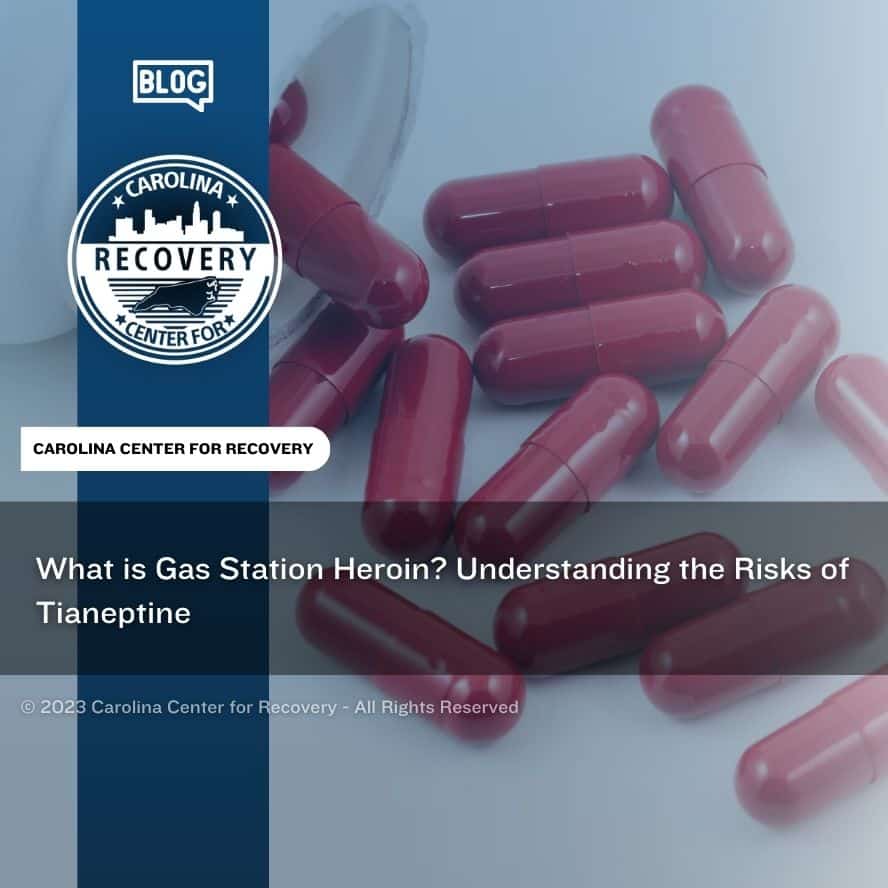What is Gas Station Heroin? Understanding the Risks of Tianeptine

Medically Verified: 2/1/24
Medical Reviewer
Chief Editor

All of the information on this page has been reviewed and verified by a certified addiction professional.
Most people don’t expect to find dangerous, addictive drugs on the shelves at gas stations or convenience stores. Tianeptine, a dangerous substance, is available for sale in the US without warning labels on its packaging.
Tianeptine is an opioid that works similarly to heroin, but manufacturers label it as a dietary supplement. Anyone, including children and teens, can purchase this dangerous substance.
It is crucial to understand the risks of tianeptine and avoid these products. You must also seek treatment for opioid abuse when needed. Contact the Carolina Center for Recovery team now. They can provide information about our substance abuse treatment programs and schedule assessments at our treatment center.
What is Gas Station Heroin?
Tianeptine was first developed in France in the 1960s as an antidepressant. Unlike other antidepressants, it does not alter neurotransmitter levels. Instead, it binds to opioid receptors in areas of the brain related to pleasure, pain control, and emotional regulation.
People refer to tianeptine as “gas station heroin” because the effects of this drug mimic the effects of heroin and other opioids. Common brand names for these supplements include:
- Coaxil
- Red dawn
- Neptune’s Fix
- Pegasus
- Tianaa
- Tianna
- Za Za Red
- Stablon
Tianeptine has other names, including tianeptine sodium and tianeptine sulfate. It is available in pill and powder form.
Is Gas Station Heroin Addictive?
Tianeptine is a highly addictive substance that is available in many places throughout the country. It’s critical to understand the risk of addiction and other complications and avoid this substance. Addiction experts advise people to avoid tianeptine products at all costs. They warn that the effects of tianeptine are similar to controlled substances and that it has a high risk for addiction.
People who use tianeptine products may quickly develop tolerance. This means that they need to use high doses to get the effects they want. People who frequently use tianeptine may develop a physical dependence on it. If they stop using it, they are likely to experience withdrawal symptoms.
Tianeptine became popular as an antidepressant in Europe several decades ago. However, now that medical specialists understand the risk of addiction, they often prescribe other medications that don’t lead to physical dependence.
None of the agencies that regulate food or medications in the United States have approved tianeptine for sale or use. However, a legal loophole allows manufacturers to sell it as a dietary supplement. Governmental agencies do not regulate supplements in the United States.
Understanding the Risks of Tianeptine
As tianeptine has gained popularity, poison control centers have reported more calls related to this dangerous substance. People who use tianeptine can experience harmful side effects. Some die from an overdose.
The Food and Drug Administration issued a warning to the public about tianeptine after the Centers for Disease Control and Prevention (CDC) reported 20 cases of severe medical complications in New Jersey related to the drug. Of the 20 people who needed medical care, 13 required admission to an intensive care unit (ICU).
Manufacturers of tianeptine products market them as dietary supplements. They advertise that these supplements can treat anxiety and reduce symptoms of major depressive disorder. However, tianeptine exposure can cause serious, sometimes life-threatening consequences.
The side effects of tianeptine use may include:
- Physical dependence and addiction
- Drowsiness
- Agitation
- Confusion
- Rapid heart rate
- Excessive sweating
- Slowed or stopped breathing
An opioid overdose can occur if someone takes high doses of opioids. An overdose is a life-threatening emergency that requires immediate medical intervention. Some of the most common signs of an opioid overdose include:
- Limp arms and legs
- Vomiting
- Gurgling or choking noises
- Blue lips or fingernails
- Loss of consciousness
- Pale, cool, or clammy skin
- Slowed or stopped breathing
If someone near you is experiencing the symptoms of an opioid overdose, call 911 right away. Give a dose of Narcan (naloxone) if you have it. Wait with the person until help arrives.
If you or someone you love develop an addiction to tianeptine or other opioids, you must seek treatment as quickly as possible to avoid long-term harm or death.
Treatment for Opioid Abuse and Addiction
Anyone who uses opioids can develop an opioid use disorder. People who develop opioid dependence require medically supported detox services, treatment, and ongoing care.
Opioid addiction treatment begins with an intake assessment. This evaluation will determine which course of treatment can help you stay safe and lead to long-term success in recovery. You may require medications, behavioral therapies, counseling, education, and other treatments to put opioid addiction in the past.
Getting the help you need to overcome opioid addiction doesn’t need to be complicated. Contact the caring specialists at the Carolina Center for Recovery to learn about our holistic treatment programs. We offer comprehensive treatment and continuing support for people with an opioid use disorder. Contact us now to get started toward a healthier future.

